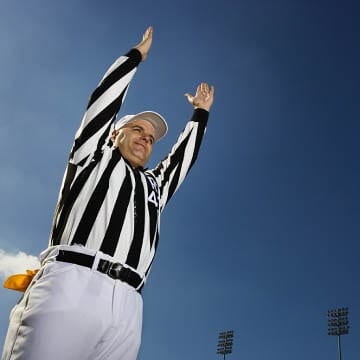
January: League and provincial cup games on pitches that you would not put cattle on. February: More of the same with a few college games thrown in. March: Ball introduced to training, but only once a week. More sore muscles. April: Business end of league. May: Start of championship. June: Man in white coat undoes all your hard work. No, not a doctor, but an umpire.
With the effort being put into county teams being doubled year on year, the GAA as an organisation that seems to be paying less and less attention to the action on the field. The square ball decision, or lack of, from last weekend’s All Ireland football semi final just highlighted once more the need for the GAA to seriously look at the way in which their games are officiated. Adding the disputed Down goal to a list, which this summer includes, Tomas O Se’s elbow against Limerick, Kilkenny’s barging of Donal Og Grady, Meath’s illegal goal in the Leinster final and Cork’s dubious points in the other football semi, makes for poor reading.
The GAA is an organisation dripping in money and one which could easily afford video evidence, to have two referees in a championship game and to have all umpires’ sight tested. With 18 referees on the inter county football panel alone, the GAA could easily afford to make those referees professional.
The American football referees are professional, they travel in the same group to all their games, but they also have an ability to explain their decisions to the crowd. It may be a jump too far into the future for the GAA, but one inter county star this week commented, “Even if the referees explained it to the players, it would be good enough”.
We are all human and mistakes do happen, but when one blatant mistake can undo seven months work for an entire panel and management team, something has to be done. It is as simple as this. The GAA and their refereeing structure need to step up to the professional level being reached by their amateur players.


